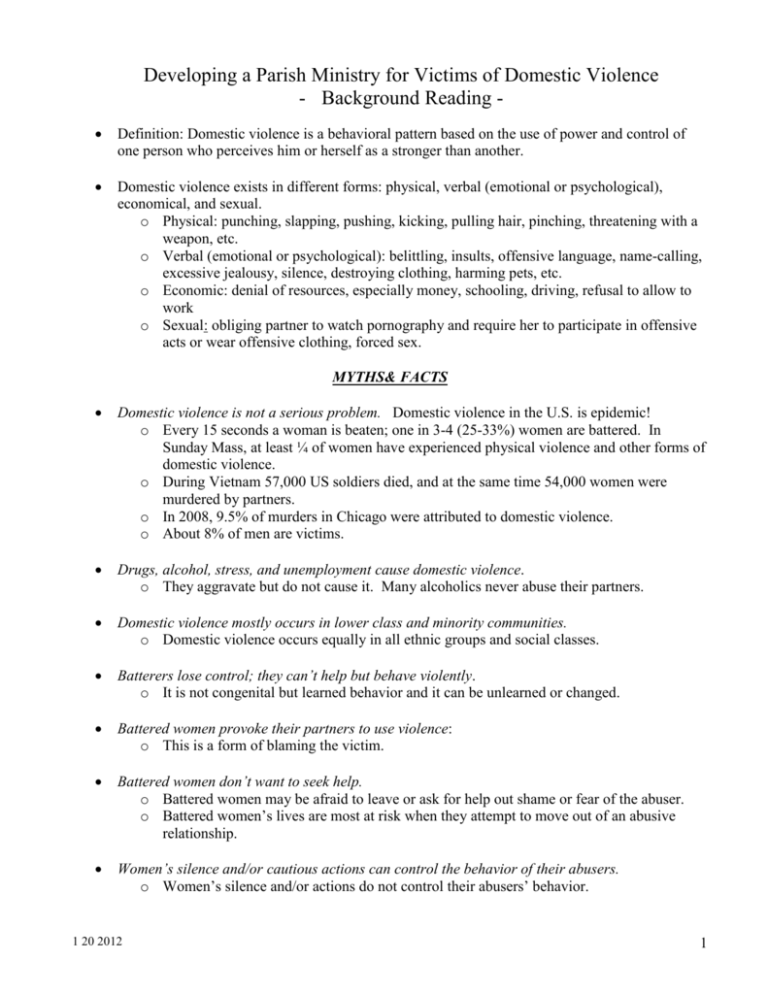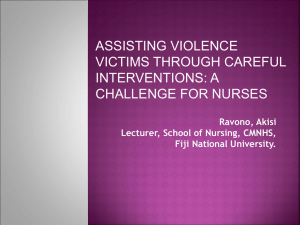Developing a Parish Ministry for Victims of Domestic Violence
advertisement

Developing a Parish Ministry for Victims of Domestic Violence - Background Reading Definition: Domestic violence is a behavioral pattern based on the use of power and control of one person who perceives him or herself as a stronger than another. Domestic violence exists in different forms: physical, verbal (emotional or psychological), economical, and sexual. o Physical: punching, slapping, pushing, kicking, pulling hair, pinching, threatening with a weapon, etc. o Verbal (emotional or psychological): belittling, insults, offensive language, name-calling, excessive jealousy, silence, destroying clothing, harming pets, etc. o Economic: denial of resources, especially money, schooling, driving, refusal to allow to work o Sexual: obliging partner to watch pornography and require her to participate in offensive acts or wear offensive clothing, forced sex. MYTHS& FACTS Domestic violence is not a serious problem. Domestic violence in the U.S. is epidemic! o Every 15 seconds a woman is beaten; one in 3-4 (25-33%) women are battered. In Sunday Mass, at least ¼ of women have experienced physical violence and other forms of domestic violence. o During Vietnam 57,000 US soldiers died, and at the same time 54,000 women were murdered by partners. o In 2008, 9.5% of murders in Chicago were attributed to domestic violence. o About 8% of men are victims. Drugs, alcohol, stress, and unemployment cause domestic violence. o They aggravate but do not cause it. Many alcoholics never abuse their partners. Domestic violence mostly occurs in lower class and minority communities. o Domestic violence occurs equally in all ethnic groups and social classes. Batterers lose control; they can’t help but behave violently. o It is not congenital but learned behavior and it can be unlearned or changed. Battered women provoke their partners to use violence: o This is a form of blaming the victim. Battered women don’t want to seek help. o Battered women may be afraid to leave or ask for help out shame or fear of the abuser. o Battered women’s lives are most at risk when they attempt to move out of an abusive relationship. Women’s silence and/or cautious actions can control the behavior of their abusers. o Women’s silence and/or actions do not control their abusers’ behavior. 1 20 2012 1 o Silence will more likely protect abusers than women. Women’s silence keeps them isolated. When abusers apologize, ask for pardon, and promise to change, victims should forgive them. o Often this is a honeymoon phase batterers use to control and manipulate their victims. SIGNS OF DOMESTIC VIOLENCE Symptoms of depression Constant tiredness or insomnia. Loss of appetite or overeating. Inattention to appearance, grooming or clothing. Loss of energy and interest in doing ordinary tasks. Passivity Withdrawal and isolation Physical health problems, stomach and/or headaches Body marks Fear to talk about situation or to take action Denial of seriousness of situation Excuses for partner REASONS WOMEN STAY Battered women lack accurate information about DV and help available. They are unable to identify their experience as abusive, especially if abuse is not physical. Economic dependence: Who will support her and the children? No place to go – Abuser has cut her off from family and friends; shelters are full. Identity – Women are socialized to feel they need a partner to be complete, even though abusive. Responsibility – Women are culturally conditioned to believe they are responsible for the relationship. Denial – Victims often think, “It really isn’t so bad. Other women have it worse.” Threats – Victims believe abusers’ threats. Children – Believe they need a partner to raise children; children may oppose separation. Learned helplessness – Experience has taught them they are unable to change anything. Internalization of abusers’ words, believe his belittling; “I deserve this treatment.” Shame, guilt and humiliation – May think: “I don’t want anyone to know.” Fear that partner will harm her, the children or commit suicide. Want to help partner – “I can help him get better.” Love – Loves partner and believes her love must be unconditional. Duty – Marriage vow: “Until death do us part.” Extended family urges her to try harder. Religious beliefs – “Wives be subject to your husbands.” It’s God’s will. It’s punishment. o Abuse is cross she must bear and a way for her to imitate Jesus; must pray harder. Women know that leaving the relationship does not ensure an end to the violence. o Battered women’s lives are most in danger at time they attempt to end the relationship. 1 20 2012 2 DYNAMICS OF ABUSERS Have low self-esteem. Have low opinion of women and rigid role expectations. May be good providers and may be loving and kind at times. Treat their partners as a possession. Are overly suspicious and accusatory (jealous). Blame victims. Minimize their abuse. Have quick, explosive tempers. If abused or witnessed abuse as children many times more likely to abuse. Are remorseful after violence. Feel entitled to have their own way. MYTHS ABOUT MEN WHO BATTER They abuse substances and once they stop, the violence will end. Batter because they were battered as children. Are out of control, and cannot control their anger. Have diagnosable psychiatric conditions. Come primarily from ethnic minorities. Are generally unemployed. When they stop abusing alcohol, they stop being violent. Are generally violent “criminal types.” Do not love their partners. PASTORAL GUIDELINE OF MINISTERING TO VICTIMS OF DOMESTIC VIOLENCE Have a healthy suspicion that every woman seeking assistance or wanting to speak to a priest or minister may be a victim of domestic violence. Respond with compassion for whatever problem she might bring, e.g., lack of faith, depression, anxiety, confusion, anorexia, “family problems,” etc. When you suspect abuse, speak with the victim alone. Affirm the person’s courage in coming for assistance. Build up her self-esteem. Listen carefully and patiently. She needs to talk and be heard. She may want you to hear all about the abuse but likely she will dissimulate, minimizing it. If she is hesitant to be specific, ask questions to get more information. o Has he hit you? How did he hit you? When was the last time? o Does he use bad words with you? What does he say? o Is he jealous? Does he try to control you? How? o Are you afraid? What makes you afraid? o Do you have anyone to talk to, anyone to support you? Believe the victim. She is not exaggerating. Reassure her repeatedly, “You do not deserve to be treated this way.” “It is not your fault.” Don’t ever think or say that she might have caused the violence. Don’t make maintaining the family together a goal. Don’t encourage her to return to the abuser. It’s her choice. Don’t take over for her. 1 20 2012 3 Don’t encourage her to leave the abuser either but rather seek help in making a decision. Don’t pressure her to make a decision but urge her to take steps to be safe and get help. Assure yourself she will be safe if she returns; make a safety plan with her. o Prepare steps to take when abuse occurs again, call 911. o Make a list of people to call in emergency and have it with you. o Know where knives and guns are in the house. o Keep important documents in a safe place, including cash, birth certificates, insurance cards, important phone numbers. o Pack and hide a suitcase with clothing and personal items. Don’t assume that if she is more assertive, he will change; he may become more violent. Ask about drug and alcohol abuse, but remember they do not cause the violence; they only aggravate it. Ask about his treatment of the children. Remember you are a mandated reporter of child abuse, though if there is abuse, the best option is for her to report it with you supporting. Do not meet or talk with the abuser unless she arranges it. Her safety comes first. If she comes with her abuser, ask her permission and opinion about the consequences. Abusers always minimize their violence and offer excuses. Do not advise marriage counseling. First she needs DV counseling, and he needs counseling for his violent behavior. Do not belittle the abuser but denounce his violent behavior as not justified. Do not get involved with the abuser’s legal defense. Do not try to assess his degree of conversion or remorse. He needs DV counseling and not simply anger management or religious conversion. Be careful about recommending prayer for the abuser’s conversion. It may distract her from seeking help, and, in the end, she may blame God or her lack of faith if he doesn’t change. Do not talk about forgiveness until she is free of DV and has received counseling. Ask her if she feels weak or strong; remind her she is facing a major challenge and for that she needs to gain strength; for that reason she needs counseling and a support group. Do not try to be the counselor yourself, unless professionally qualified. Provide her with resources: phone numbers for emergencies; offer to make calls to counseling services or a shelter with her. Victims usually need at least a few individual counseling sessions and then a support group in which to share their experiences and receive affirmation, guidance and support. If she wants an order of protection, accompany her to the police station. Promise your continued support; give her your phone number. Pray with her. Keep everything confidential or ask her permission to share her information. Do not meet with her or him at their home, rather in your office or a neutral, safe place. Motivate her to take steps toward a solution by asking and or noting: o How is this affecting your children? o While they love their father, the boys are learning how to be abusive and the girls how to be victims. o This mistreatment will probably get worse. o I’m concerned for your safety. o You do not deserve to be abused. o If you ever decide to leave, I am here to support you. o Assure her that God and the Church do not want anyone to stay in a violent relationship. He has broken the marriage covenant. 1 20 2012 4 Resources Brenda Branson and Paula J. Silva, Violence Among Us: Ministry to Families in Crisis. Valley Forge: Judson Press, 2007. Bishops Ricardo Ramirez, Speaking the Unspeakable: A Pastoral Letter on Domestic Violence, 5050-523-7577, www.dioceseoflascruces.org Charles W. Dahm, O.P., Chicago Archdiocesan Director of Domestic Violence Outreach, St. Pius V Parish, 1919 S. Ashland, Chicago, IL 60608 Office 312-2226-6161, extension 24; cdahm@sbcglobal.net USCCB, When I Call for Help: A Pastoral Response to Domestic Violence Against Women. USCCB: Washington DC, revised 2007. Videos/DVDs Broken Vows: Religious Perspectives on Domestic Violence, Center for the Prevention of Sexual and domestic Violence: 206-634-1903, cpsdv@cpsdv.org Broken Promises; Fireproof; Sleeping with the Enemy; Cicatrices, Burning Bed Faith Trust Institute www.faithtrustinstitute.org 2400 N 45th Street Suite 101; Seattle, WA 98103, telephone: 206-634-1903: 206-634-0115 fax 1 20 2012 5 WAYS TO IMPROVE PARISH SENSITIVITY TO VICTIMS OF DOMESTIC VIOLENCE Preach about domestic violence o One sermon per year o Use explicit examples of DV victims in other sermons, e.g., for faith, courage, etc. o Correct distortions of scripture o Explain that DV includes physical, emotional, sexual and economic violence o State DV is a crime and a sin and never justified Form a parish ministry to DV victims o Preach at all Masses; invite those interested in helping to sign up after Mass. o Meet with those who sign up and ask about the source of their interest, many will be survivors. o Form a support group with those who want it (best to find a facilitator in advance). o Form an advocacy group with the others, but include the victims who want to participate. o Hire a staff pastoral counselor with experience in domestic violence counseling. o Develop relationships with local police and other related agencies. Use testimonies in the pulpit on special occasions to sensitize the congregation o On Mother and Father’s Day have victims and/or reformed abusers testify. o International Day of Women – March 10 o October: Domestic Violence Awareness Month Use pastoral interviews and programs to discover victims o Marriage preparation o Baptismal registration o Confession, e.g., anger with partner o Family problems of all kinds o Educate teen group about domestic and teen dating violence o Have men’s group be active on speaking out against domestic violence Prepare/train staff and ministers, especially catechists to identify DV in children’s families o Send staff to 40 hours DV training. o Invite Chicago Metropolitan Battered Women’s Coalition to do faith-based training. o Have a directory or resource manual available for receptionist and staff. Become a safe place for victims o Print periodic short articles or announcements about domestic violence in bulletin. o Help recruit volunteers for local shelter and domestic violence programs. o Install signage in parish that speaks against violence. o Put up posters with emergency numbers in office and church lobby. o Place cards with emergency phone or contact numbers in women’s washrooms. Participate in local domestic violence organizations and events Involve DV survivors in ministries and as volunteers; they want to give back. 1 20 2012 6







